Amy McPherson takes a tour of the apiary of Borgo Pignano and finds a heaven not only for the guests enjoying the luxury surrounds of this Tuscan retreat, but also a sustainable paradise for the estate’s bees as well
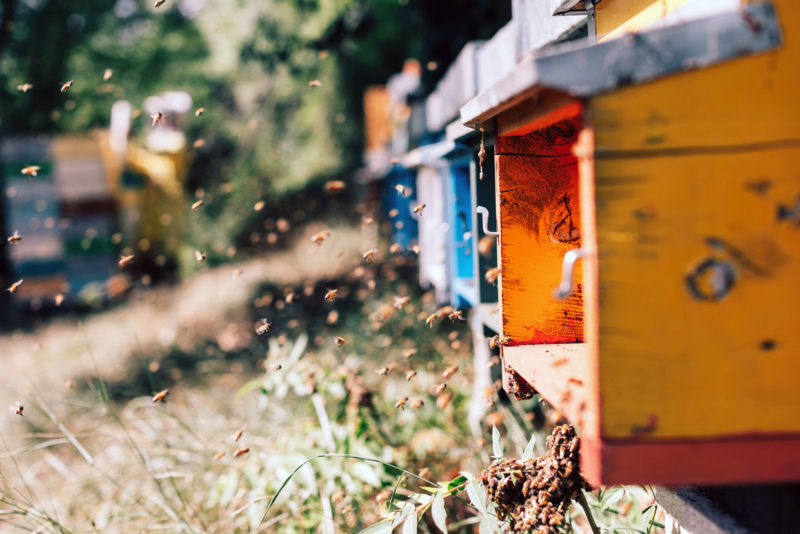
Francesca Orlandini carefully picks up a struggling bee from the ground, then deposits it in the grass safely away from human activity. Like a mother hen watching over her chicks, she watches as the bee slowly recovers from its ordeal and then buzzes lethargically towards the hives.
This is her job. Francesca is the beekeeper at Borgo Pignano, a beautiful retreat and apiary in the heart of Tuscany.
“You know, this weather really isn’t very good for these bees,” she sighs, returning her attention to our conversation. “It confuses them; it makes them lose their way.”
With our seasons distorted by unusual weather, we are all feeling the changes in our climate today.
We humans – if we can afford it – simply turn up the heating, switch on the fan or the air-conditioning, or pay for luxuries that help us cope.
For bees, however, a simple life of following nature’s patterns has become a battle for survival.
“They need our help,” says Francesca as she leads the way from the retreat’s organic vegetable farm towards the hives.
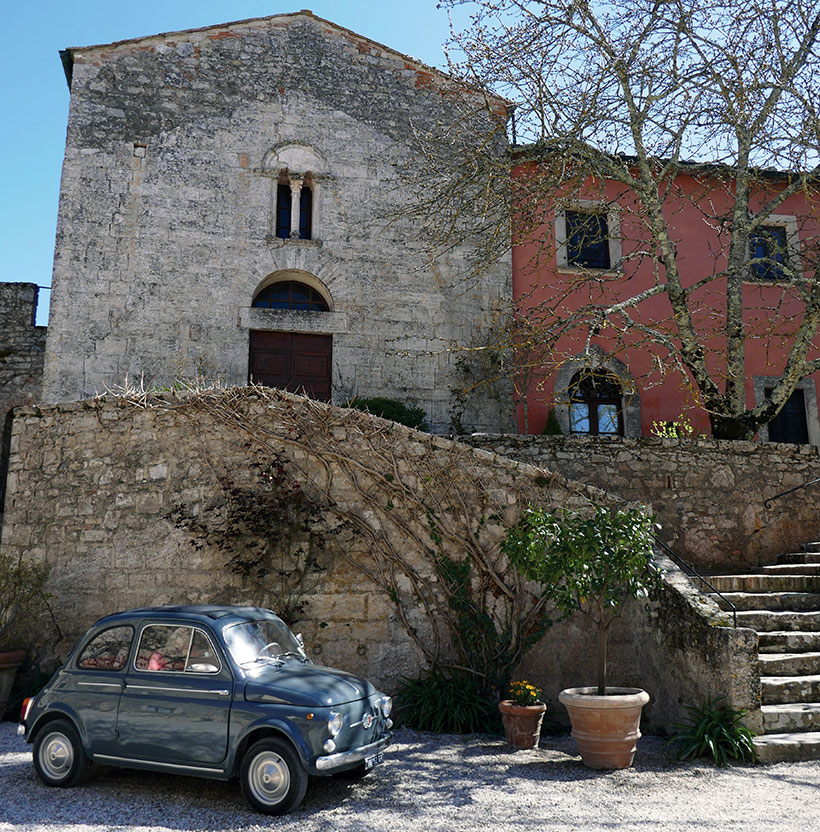
A sustainable retreat in Tuscany
A self-supporting eco-retreat where everything is managed with a sustainable future at heart, Borgo Pignano strives to give nature a helping hand at the same time as providing the quality of life you would expect from a luxury hideaway in Tuscany.
Alongside the alluring Tuscan cliché of the soaring cypress trees that line the driveway towards reception, the apricot honey walls and the sweeping outlook towards the surrounding undulating hills, are the solar-powered and chip-fired boilers that heat and power the estate.
A large organic farm produces provisions for the kitchen; water supplies are harvested from rainfall; and a team of passionate people work on the ‘reduce, reuse and recycle’ method to maintain a low environmental impact.
To see it all for myself, I go for a ride on a resident horse. His name is Mumbo – a strong, young stallion with shiny black coat. Just up ahead of us are the estate’s riding instructor, Barbara Cautillo, and her beautiful chestnut mare.
We begin by walking the horses around the farm, where head gardener Kirsten Bartels is busy tending a well-stocked vegetable bed.
It is early spring and there isn’t much yet to offer the chef, and Kirsten admits that from time to time they do need to purchase ingredients elsewhere, but the idea is to use as much of the farm’s own produce as possible.
To this end they employ a ‘no harm’ farming philosophy and, as far as possible, grow fruit and vegetable varieties that are native to Tuscany. The herbs in the garden not only flavour the dishes served at the restaurant, they are also used to make essential oils for the spa and the handmade natural soaps you will find in the resort’s bathrooms.
“Look, the artichokes are almost there!” Kirsten caresses an immature purple globe of the spiky plant. “If you’re still here next week, you’ll be having these for dinner.”
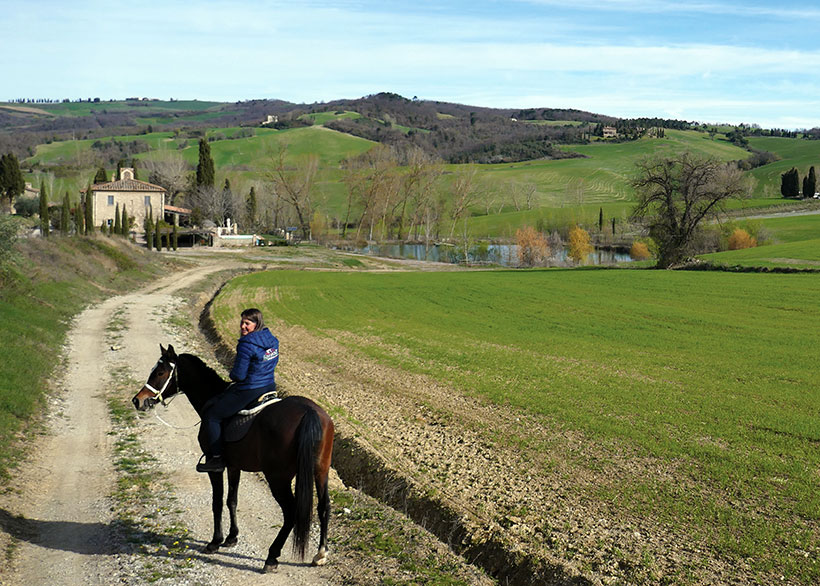
The eco-farming experience
Kirsten loves to meet the guests of the estate when they wander into the garden compounds, especially if they bring their children.
“I think the more people see the farming process – the more they see when the strawberries will be ripe and when the tomatoes will fruit – the better they understand the idea of the seasonal availability of produce. When they can see it happen, then they understand that one of the best ways to help the natural environment is to eat what is available”, she explains.
“When you are buying from supermarkets and everything is available every day, think just how much carbon footprint and storage resources it takes to transport that produce and keep it fresh. It is simply not sustainable.”
Continuing our ride, we pass the beautiful villas that are restored and decorated using locally sourced and environmentally friendly materials and powered by renewable energy.
We pass the pigsty and the fields of grains and cereals grown to be milled into the estate’s own flour. We trot through a small section of the forest and eventually end up back at the stable, where I give Mumbo a head nudge before beginning my walk back to the farm.
On my walk, I can hear the stars of the show constantly buzzing about the flower beds – the bees, busily producing the organic honey of Borgo Pignano, which guests enjoy at breakfast and which is used in some of the chef’s special recipes.
“I think people need to understand that being organic is not just something we do for marketing,” explained Francesca.
“Not using harmful chemicals and man-made fertilisers means our bees can do their work in a safe environment without any risks.”
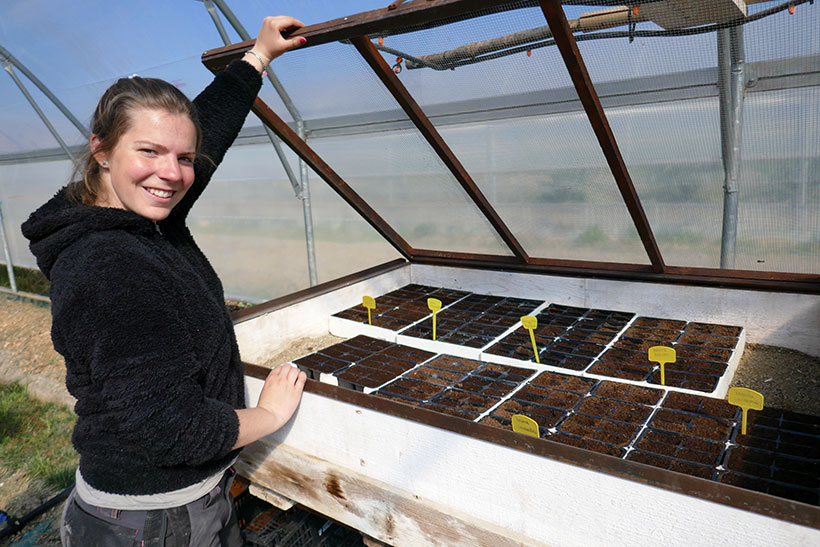
Responsible Tuscan beekeeping
Another experience you can have here is to witness beekeeping first-hand – to learn the difference that responsible beekeeping can make to both the lives of the bees and to our environment.
You can put on a white beekeeping suit and get up close to the hives and see how non-harmful ways of beekeeping work, and why these small creatures have such an impact on our own lives.
It’s not only climate change disturbing their natural life pattern. Like all creatures, bees experience many immediate dangers in their short lives.
On average, a bee’s life span is forty days. During this time, they face the modern dangers of the pesticides, chemicals and other toxic materials that they come across during their days’ dashing between the flowers.
And one small mistake can end up killing the entire colony.
“If a bee happens to digest something that is toxic to them – it might be something that is already in the flower they are working with – they will definitely die,” Francesca explains. “But the worst thing is when they bring this back to the hives.
“If they deposit infected pollen, they produce honey that is also infected, and then the entire colony dies together.”
Ensuring that the lands surrounding the bees are organically maintained is one way to protect them from this misfortune.
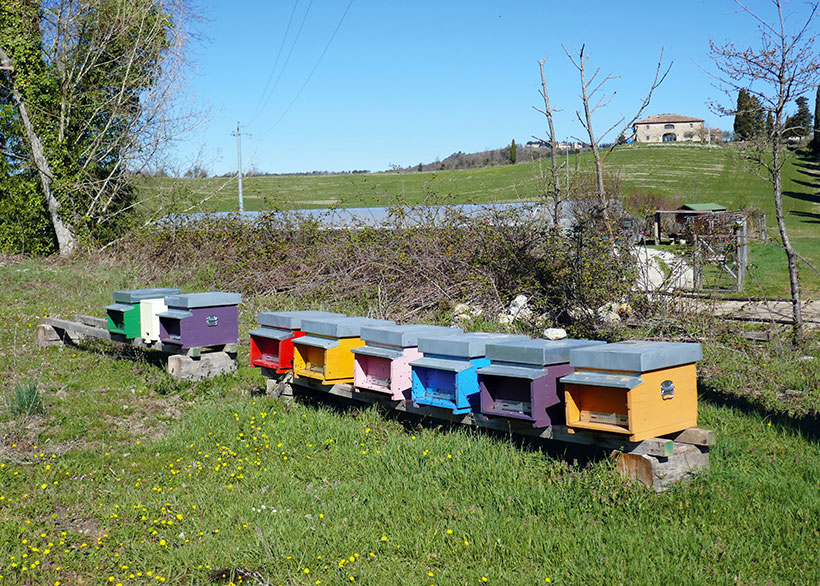
Defending the colony
As we chat about the lives of bees and their vulnerability, two bees mock-charge me from the nearest hive. These are guard bees.
They are there to defend and protect the colony – in the natural run of things, bees do have their own Ministry of Defence to take care of them.
We won’t come to any harm, but in the interest of their welfare as much as our own, we move away. If a bee stings you, it dies, sacrificing its life for the safety of the colony.
We watch the hives for a little longer before starting the ritual of saying goodbye.
Francesca looks once more towards the hives, and the only way to describe her gaze is to say that it is the look of a mother being very protective and proud of her children.
“I love really them,” she says. “They are like my babies.”
The bees who went in search of chestnuts
Tuscany has a long history of beekeeping and so it is no wonder that an hour from Borgo Pignano is another estate, Il Borro, whose bees are also creating wonders for the delight of the chefs and their guests.
Vittoria Ferragamo Debolini’s father bought the estate, which includes its own medieval village, from one of the last noble families of northern Italy in 1993. He then painstakingly turned it into one of the more unusual resort experiences in Tuscany.
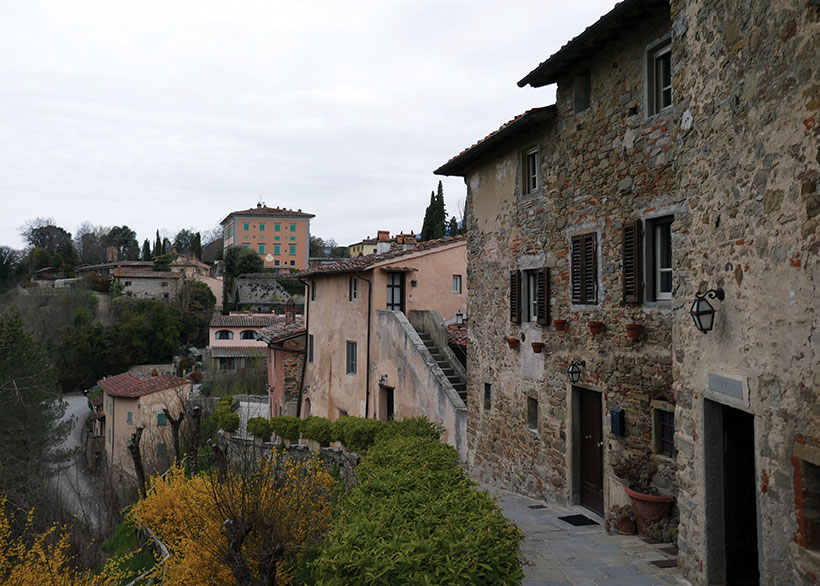
As part of the operation, all the estate’s land has been going through a lengthy organic conversion for farming.
Among the many products the estate produces is its own organic honey, and I learn that honey is like wine: each year can be completely different.
“A few years ago, our bees decided to surprise us,” says Vittoria. “During that year, we collected the honey and went through a tasting and certification process so we could label it.
Normally we get mixed-flower honey, because bees are generally not very selective.
But we tasted it, and realised, ‘Oh! This is chestnut honey!’ And for sure, the testing certified it to be chestnut honey, which is really surprising because the nearest chestnut trees are five kilometres away.”
For honey to be certified as a monofloral honey it must contain a certain percentage of the single variety pollen.
Which means, in that particular year, the bees of Il Borro decided that they liked the pollen from the flower of the chestnut tree more than they did that of any other flower.
It seems everything is entirely up to the bees. “Bees really are quite extraordinary!” Vittoria laughs.
Discover more Italian travel blogs in our archive
Words by Amy McPherson
